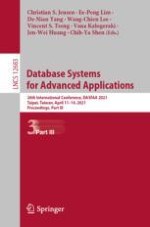2021 | OriginalPaper | Buchkapitel
Learning Disentangled User Representation Based on Controllable VAE for Recommendation
verfasst von : Yunyi Li, Pengpeng Zhao, Deqing Wang, Xuefeng Xian, Yanchi Liu, Victor S. Sheng
Erschienen in: Database Systems for Advanced Applications
Aktivieren Sie unsere intelligente Suche, um passende Fachinhalte oder Patente zu finden.
Wählen Sie Textabschnitte aus um mit Künstlicher Intelligenz passenden Patente zu finden. powered by
Markieren Sie Textabschnitte, um KI-gestützt weitere passende Inhalte zu finden. powered by
